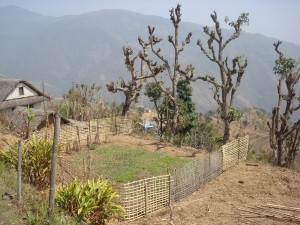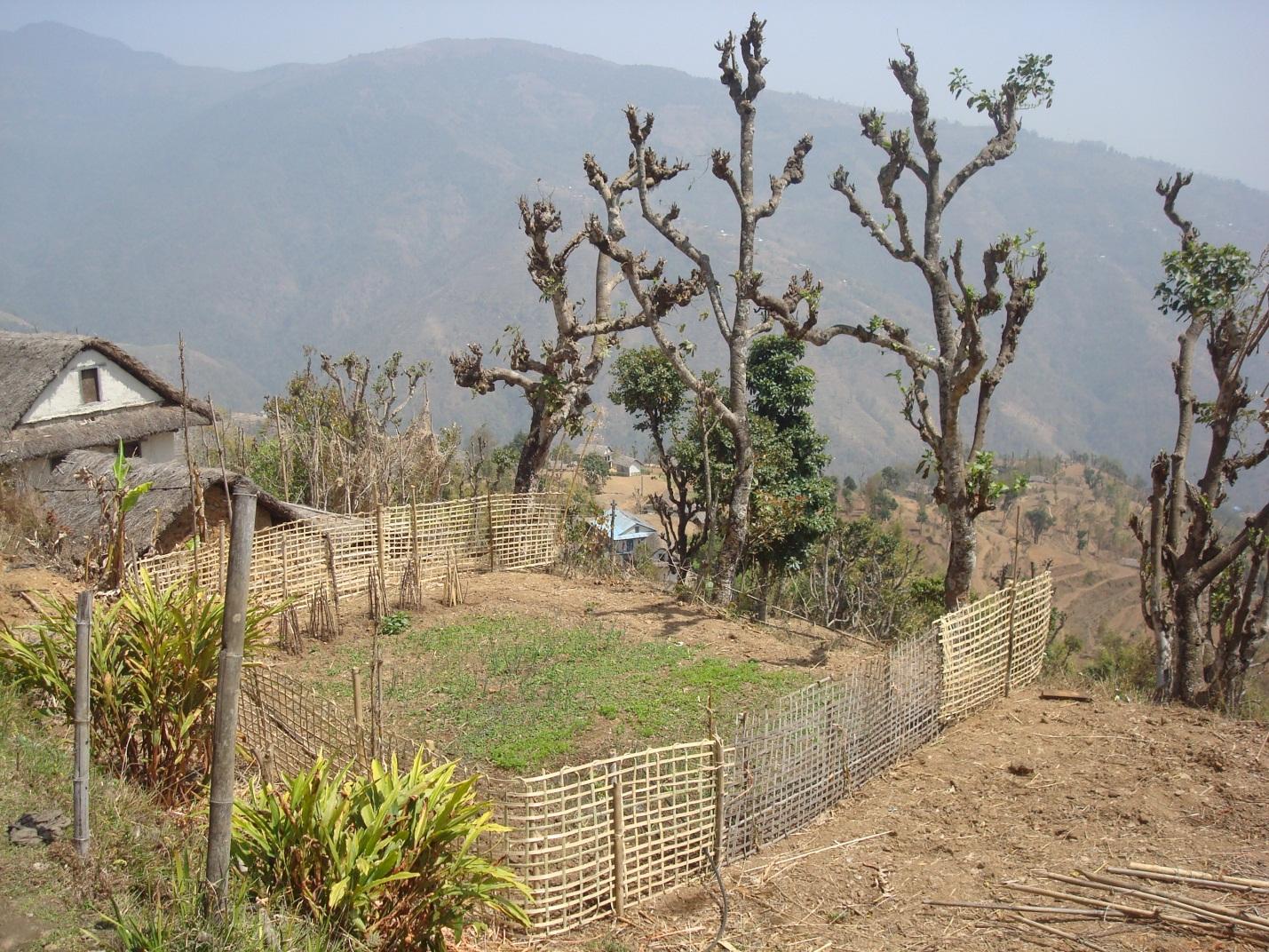by Stuty Maskey 04/07/2012
 My work, in broad sense, requires me to connect rural economy to the market system. Recently I was out in a field trip assessing the capacity to up-scale smallholder businesses dependent on forest resources. My trip got extended by a day due to lack of transportation to return home and I decided to utilize that free day by travelling with a co-traveler who worked for a different project that helped rural communities set up home-gardens. Pardon my ignorance, but as a capital-city dweller in a developing country that is infamous for being over populated,my knowledge of home-gardens was limited to small backyard where one grows vegetables for self-consumption. This isn’t altogether wrong according to the accepted definition. “Small fenced plots relatively close to the gardener’s homestead where annual, biennial and perennial cultivated species are grown in beds” (Vogl-Lukasser, 2003). Domestic animals are often integrated into the system. However, my understanding of the services of this system was definitely limited to production and consumption values, which was sheer ignorance.
My work, in broad sense, requires me to connect rural economy to the market system. Recently I was out in a field trip assessing the capacity to up-scale smallholder businesses dependent on forest resources. My trip got extended by a day due to lack of transportation to return home and I decided to utilize that free day by travelling with a co-traveler who worked for a different project that helped rural communities set up home-gardens. Pardon my ignorance, but as a capital-city dweller in a developing country that is infamous for being over populated,my knowledge of home-gardens was limited to small backyard where one grows vegetables for self-consumption. This isn’t altogether wrong according to the accepted definition. “Small fenced plots relatively close to the gardener’s homestead where annual, biennial and perennial cultivated species are grown in beds” (Vogl-Lukasser, 2003). Domestic animals are often integrated into the system. However, my understanding of the services of this system was definitely limited to production and consumption values, which was sheer ignorance.
A day’s visit to a few home-gardens convinced me that though there is undoubtedly critical roles of natural ecosystem such as wetlands and undisturbed forestland to the global ecosystem services, converted ecosystems such as home-gardens are equally important for community’s socio-cultural wellbeing as well as for services to the ecosystem.
In contrast to my regular focus at work to provide market access for rural wellbeing, I was taken aback by this simplified model of home-garden that operates outside the market system and has an important impact on the rural livelihood. After some informal interactions with gardeners, I was positive that home-gardens create and maintain relations between people because it is intertwined with community values and tradition of rural lifestyles. Home gardens typically serve for self-consumption more than market sale but this in itself is a cushion to form resilient communities to fluctuations in market prices and environmental conditions.
Although I did realize that the home-gardeners (mostly women) were engaged in it as a traditional chore and only understood the consumption services from it such as quality food, dietary diversity, safety net during food scarcity, cultural value of bartering excess vegetables, seed sharing etc. there are wide range of ecosystem services that home gardens can potentially provide such as conserving landrace, agro biodiversity, maintaining soil fertility, traditional knowledge and practices for sustainable use of biological diversity and many more that I am not aware of.
In summary, I think that as poor countries are continuously adopting and experimenting with new development models, it is important to promote native systems such as home-gardens that tap the traditional knowledge; existing social relations and can be translated to meet the national goals of food security and broader global concerns of environmental services. After all, the goal to reduce poverty can be achieved through various means including contemporary market mechanisms and age-old traditional systems.
 PICTURE: Home Garden maintained by a family in rural Nepal. The gardener (woman aged about 50 years) said that under the technical guidance (e.g. rain water harvesting for dry months) from a project that supports such initiatives she can now support her family nutrition throughout the year with diverse dietary supplements whereas earlier the family resorted to only maize or rice for several months.
PICTURE: Home Garden maintained by a family in rural Nepal. The gardener (woman aged about 50 years) said that under the technical guidance (e.g. rain water harvesting for dry months) from a project that supports such initiatives she can now support her family nutrition throughout the year with diverse dietary supplements whereas earlier the family resorted to only maize or rice for several months.
Photo by Stuty Maskey
Reference:
Vogl-Lukasser, B. 2003. Tradition, dynamics and sustainability of plant species composition and management in home gardens on organic and non-organic small scale farms in alpine eastern tyrol, Austria. http://boku.academia.edu/ChristianRVogl/Papers/1017972/Tradition_dynamics_and_sustainability_of_plant_species_composition_and_management_in_homegardens_on_organic_and_non-organic_small_scale_farms_in_Alpine_Eastern_
STUTY MASKEY earned an MA in Public Policy from Oregon State University as a USAID scholar from Nepal and is an ICRPS alumna. She is currently working for a forestry programme jointly managed by the Government of Nepal and the Swiss Agency for development and cooperation. She is interested to understand and establish mechanisms to harness the economic potential of forest resources to address poverty and to ensure equitable benefits (environmental and economic) for the forest dependent communities.
